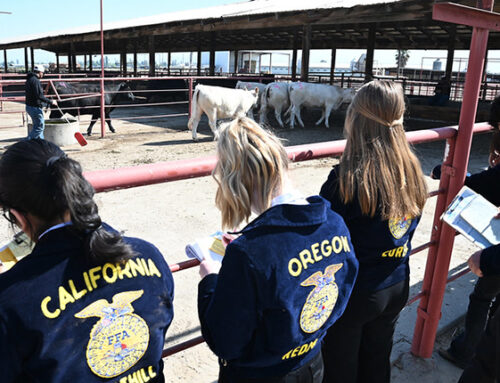A team of irrigation research specialists from the U.S. Department of Agriculture has joined with California State University, Fresno’s Center for Irrigation Technology to launch a new study on the irrigation needs of pomegranates.
The project aims to help California’s agricultural industry respond to growing consumer demand for the distinctive, tough-skinned fruit, said James Ayars, research agricultural engineer for the USDA’s Agricultural Research Service based in Parlier, a few miles east of Fresno.
Pomegranates have been grown worldwide for as long as most people can remember but haven’t been widely popular because they are difficult to peel and eat. A tough, leathery skin surrounds clusters of pulp-covered seeds that have to be plucked out individually to be eaten.
Yet pomegranates are known to be a good source of antioxidants, and that feature has attracted new consumers looking for natural ways to improve their health. Several years ago, pomegranate juice began appearing in abundance and caught on with consumers who don’t want to fuss with the fruit, but like the taste and health benefits of the juice.
It has become an increasingly popular choice on its own, mixed with other juices, as an alcoholic beverage and in cocktails, in marinades, salad dressings and vinegar.
“As the general population becomes more health conscious, there is an emerging need to find crops that will provide improved nutrition and health benefits,” Ayars said.
Pomegranate has been recognized as an emerging crop in California. Pomegranate is also thought to be drought- and salt-tolerant, which makes it attractive to farmers with saline soils and facing water shortages. “However, very little is known about the water requirements for pomegranate or the effects of soil quality on production,” Ayars said.
“Since surface irrigation may be inefficient, production with alternative methods needs to be evaluated,” he said.
Drip irrigation has been characterized as very efficient and is gaining wide acceptance for perennial cropping in California. “Studies are needed to evaluate the water requirements for pomegranate and to determine its suitability for production on a range of soil types using alternative irrigation systems.” Ayars said.
As part of the project, Ayars has overseen establishment of a three-acre surface-drip-irrigated test plot of pomegranates at the San Joaquin Valley Agricultural Sciences Center in Parlier. Researchers will use two large weighing lysimeters to determine specific crop-water requirements for the trees during crop development.
Each weighing lysimeter is planted with two trees and irrigated with drip irrigation. The scale can accurately record the amount of water applied to and used by the trees it holds.
“The lysimeters will help us to determine water requirements and crop coefficients for newly-planted pomegranate trees,” Ayars said. “These data will be suitable for use in irrigation scheduling and water allocation by irrigation districts.”
Partial funding for this project was provided by the Fresno State-based California State University Agricultural Research Institute, with additional support by Paramount Farms. For more information, contact Ayars at james.ayars@ars.usda.gov.
Related links:



